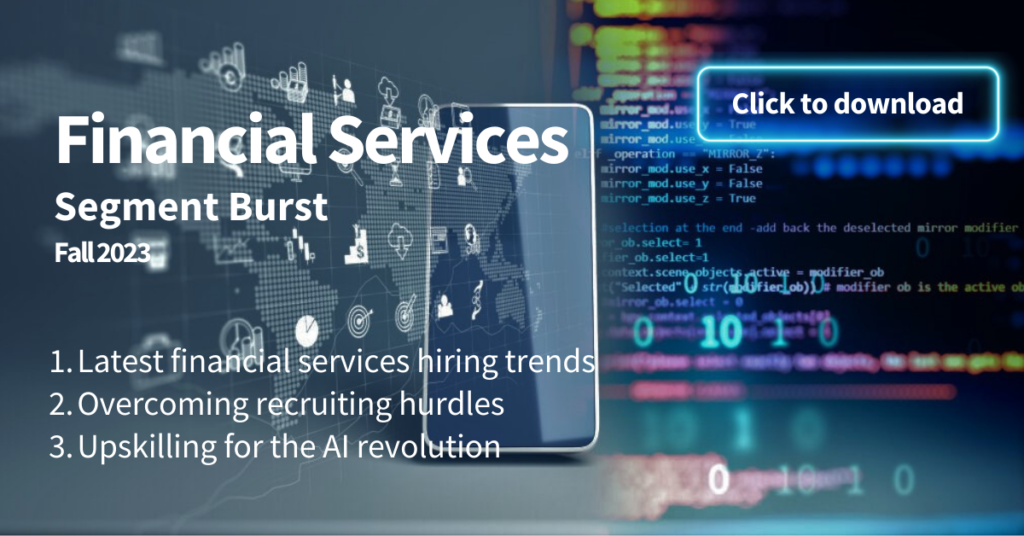Financial Services Segment Burst: Fall 2023
Research
.
In the Fall 2023 Financial Services Segment Burst, we explore the most recent trends in the financial services sector including:
- Most recent financial services hiring trends
- How to overcome recruiting hurdles to hire top financial talent
- Upskilling for the AI revolution
Latest financial services hiring trends
As we head into the last stretch of 2023, gaining insights into the hiring trends influencing the talent ecosystem in financial services becomes imperative. Employers are recognising a marked increase in the demand for soft skills. More than ever attributes such as communication and leadership are being sought after, with 60% of recruiters highlighting these as the skills they value most in potential employees.
While technical prowess is undeniably important, the significance of soft skills cannot be overstated. Communication, empathy, and leadership traits are just as vital in the current talent landscape. Therefore, employers should place a high priority on these soft skills during the hiring process. Furthermore, they should cultivate an environment that offers ample opportunities for employees to develop and refine these skills, enhancing their professional growth.
Meanwhile, flexibility has emerged as a non-negotiable aspect of work arrangements in the eyes of job seekers. According to recent industry hiring reports, 75% of candidates prefer flexible working options. This trend reflects the changing expectations of the workforce and serves as a clear indicator to employers that traditional, rigid work structures may no longer be viable.
To attract and retain top talent, employers must adapt and offer flexible working options to meet this demand. This could encompass a range of arrangements, from remote work and flexible hours to a hybrid model that combines both onsite and offsite work. Such measures can significantly enhance job satisfaction and work-life balance, improving employee retention.
Yet, despite these adjustments, talent attraction and retention remain a persistent challenge for many organisations. Over 4 in 10 companies are grappling with keeping their employees engaged and committed. This statistic highlights an urgent need for robust employee engagement strategies. Employers must prioritise creating engaging work environments that meet their employees’ evolving needs and promote their growth and development. This could entail offering opportunities for career progression, competitive benefits, and creating a positive, inclusive work culture.
Overcoming recruiting hurdles
Financial firms are embracing digital change, implying an increased demand for technology professionals. Although 84% of industry CEOs are optimistic about hiring over the next two years, firms must prove their technological proficiency to successfully vie with tech firms for the same set of skilled individuals. A significant emphasis is on developing cloud competence and facilitating a safe migration from outdated technology to the cloud. This means there’s a surge in hiring for roles like infrastructure security, cybersecurity, and cloud engineering.
According to the BLS, it’s projected that through 2032, there will be 911,400 financial services job openings per year in the US alone. Banks and other financial institutions heavily depend on large-scale roles such as customer service representatives. However, the competencies required for these positions are advancing due to the intricacy of the market and customer apprehensions, so additional training and upskilling will be needed after hiring and onboarding.
How can employers overcome these recruiting challenges?
To enhance their image within the industry, financial service employers must strive to demonstrate that their goals go beyond mere profit-making.
Adopting modern recruiting technology, such as candidate relationship management (CRM) tools, can automate mundane tasks and enable recruiters to concentrate on high-impact work, building and nurturing relationships with potential candidates.
Financial service employers should underscore the benefits of their industry, including stability, superior perks, strong brand recognition, and long-term earning potential. Moreover, proactive communication about commitments to diversity, Environmental, Social, and Governance (ESG) initiatives, and community service will amplify their dedication to Diversity, Equity, and Inclusion (DE&I) initiatives. It’s also essential to strategically source talent from underrepresented groups, broadening and diversifying the talent pipeline.
Data access and metric analysis are essential for talent acquisition professionals within financial services, enabling them to evaluate hiring goals and make data-driven decisions. Despite the challenges associated with adopting new technology due to security issues and slow procurement and integration processes, financial services firms should persist with modernisation, showcasing their commitment to innovation.
Upskilling for the AI revolution
The year 2023 marked a significant uptick in the use and integration of generative AI, indicating its mainstream acceptance and 2024 is anticipated to further showcase its power and utility.
According to the latest Global Workforce of the Future report, 70% of workers worldwide already use generative AI in their workplaces. However, only 7% believe that AI will render their jobs obsolete. This data suggests that while AI adoption is widespread, a gap exists in understanding its full impact on job roles.
Considering pay stagnation, layoffs, and diminishing demand for specific skills, tech workers focus on artificial intelligence. This shift underscores the increasing need for AI expertise in the industry.
Employers can play a pivotal role in supporting their employees during this transition. For instance, by offering free AI certification opportunities companies can help their employees upskill and remain competitive in the evolving industry. Moreover, employers can invest in continuous learning and provide access to training programmes and resources that teach AI-related skills. On-the-job learning has been identified as one of the best ways to upskill employees for AI, and this approach can be supplemented with tailored training programmes that cater to specific job responsibilities.
Clear communication about the company’s AI strategy and its positive impacts can help employees adapt to changes with an open mind. Involving employees early in the AI integration process and repurposing the skills of those who may be displaced should be a coordinated and sustained effort.
Traversing the AI revolution requires a collaborative approach between employers and their workforce. By investing in reskilling and upskilling initiatives, companies can build an AI-ready workforce that is adaptive and future-proof.
Global AI regulation
The legal landscape surrounding global AI regulation is evolving, with significant strides being made in both the European Union and the United States. The EU has recently instituted regulations involving obligatory workforce representation consultations whenever AI is being considered. This move is a testament to the growing recognition of the need for enhanced control mechanisms and upskilling in the AI domain.
Simultaneously, the US is witnessing the rise of local regulation initiatives, one notable example being the AI law implemented in New York City in July 2023. This law stipulates that employers must disclose to candidates the use of AI-aided tools in hiring and promotion decisions. It also mandates the provision of an option for candidates to inquire and understand the nature of their personal data being collected. Moreover, employers are required to engage independent auditors annually to scrutinise AI tools for potential bias.
Related Post
In the Summer 2023 Financial Services Segment Burst, we explore the most recent trends in the financial services sector including:
The rising significance of the workplace community
Gen Z's ...





